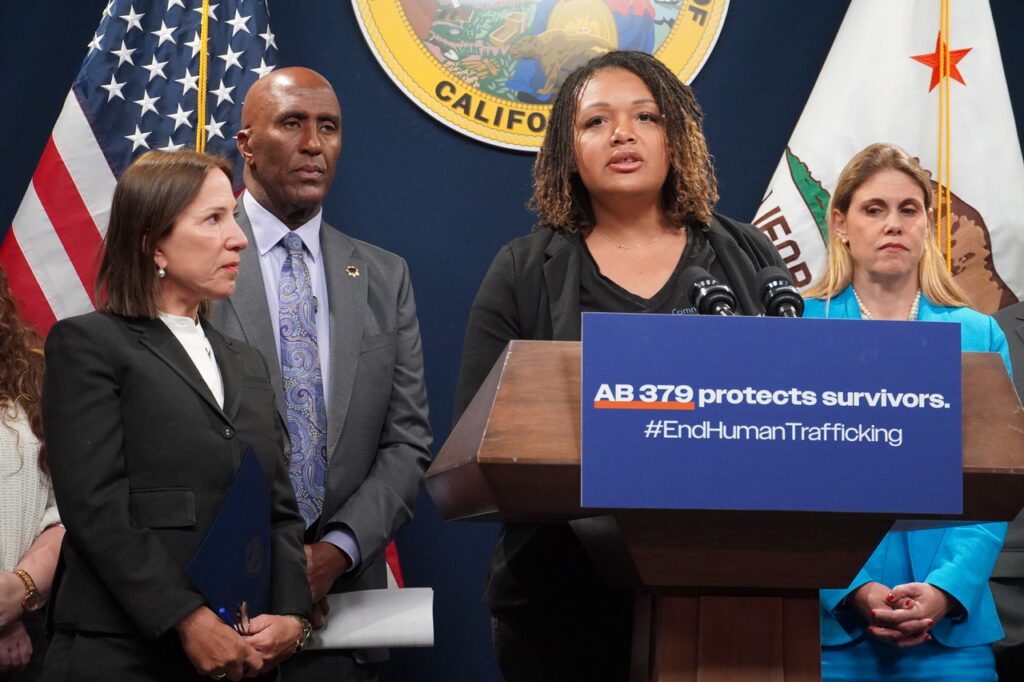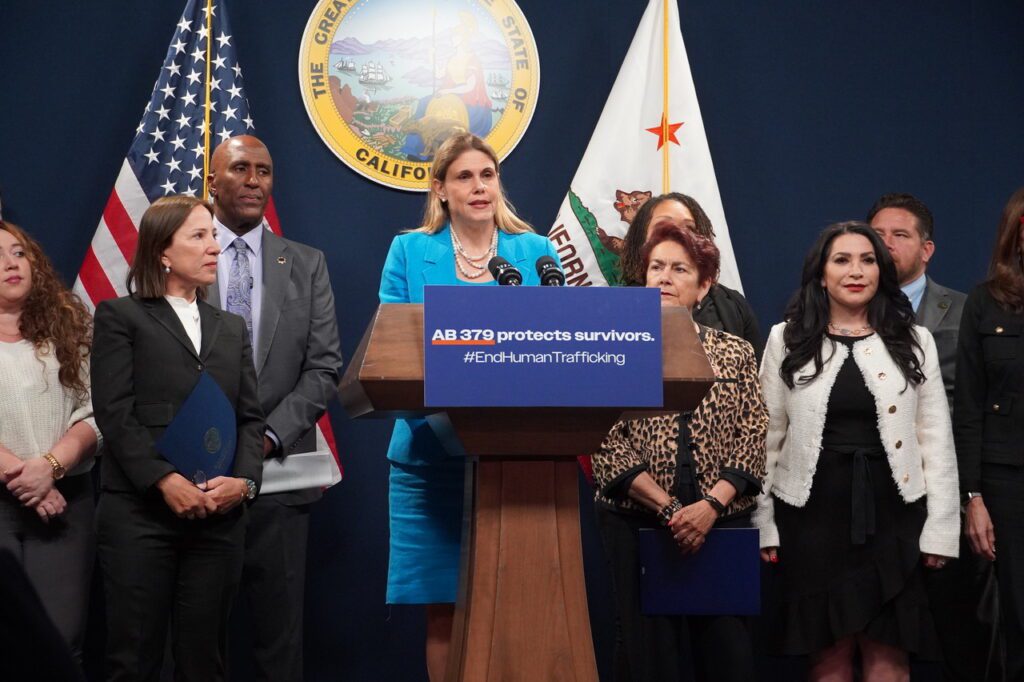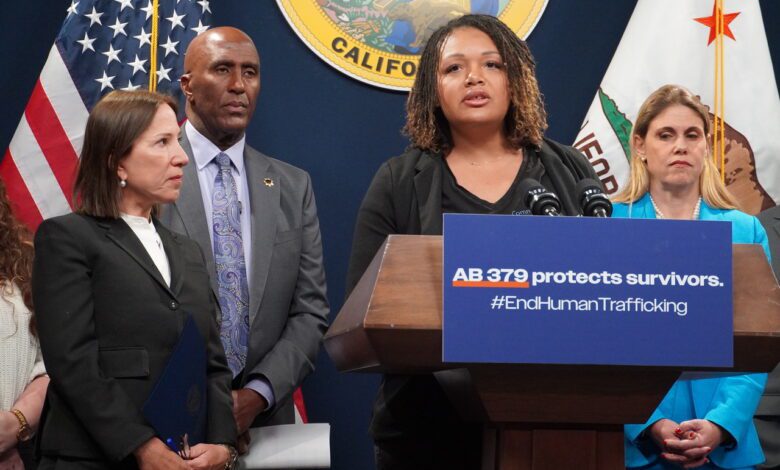Antonio Ray Harvey | California Black Media
A coalition, comprised of anti-trafficking organizations, law enforcement officers, mayors, federally recognized California tribes, organized labor leaders, and policymakers, is urging support for Assembly Bill (AB) 379.
Authored by Assemblymember Maggy Krell (D-Sacramento), the bill, “Survivor Support and Demand Reduction Act” would make it a crime to loiter with the intent to purchase commercial sex. It would also create a first-of-its-kind “Survivor Support Fund” to assist victims of sex trafficking and ensure that the crime of purchasing a minor for sex applies in any case where the victim is under 18.
“I want to solve two problems with this bill. One, we have to create more resources for victims and thousands of others who are trafficked,” Krell said. “Two, we have to crack down on the men who are buying them for sex.”
The coalition held a conference at the State Capitol Swing Space Annex last week. Sen. Anna Caballero (D-Merced), Sacramento County Sheriff Jim Cooper, San Diego County District Attorney Summer Stephan, Sacramento Chief of Police Katherine Lester, and Lt. Gov. Eleni Kounalakis all attended the event.

In addition, Sawan Vaden, Executive Director, Community Against Sexual Harm (CASH), and Regina Cuellar, Tribal Chairwoman, Shingle Springs Band of Miwok Indians, were in attendance and spoke about why they support the bill.
Krell emphasized the bill seeks a new path for attacking human trafficking by providing law enforcement more tools and stronger penalties to deter, arrest, and prosecute commercial sex buyers, while providing the necessary support for victims.
Krell spent 20 years working as a state deputy attorney general. During that time, she developed a “legal theory” that dismantled the largest online sex trafficking operation in the nation. She is the author of the 2022 book, “Taking Down Backpage: Fighting the World’s Largest Sex Trafficker — A Prosecutor’s Story.”
“AB 379 creates a law that allows law enforcement to intervene when men are out on the prowl to buy victims for sex,” Krell said.
Should the Legislature approve the bill, it would counter Senate Bill (SB) 379, the “Safer Streets for All Act,” which decriminalized loitering for prostitution in the state. The bill authored by Sen. Scott Weiner (D-San Francisco) was signed by Gov. Gavin Newsom on July 1, 2022.
Weiner authored the legislation on the premise that the crime of loitering has disproportionately impacted Black and Brown women as well as members of the LGBTQ community.
Between 2017-2019, Black adults accounted for 56.1 %of the loitering charges in the city of Los Angeles, despite making up less than 8.9% of the city’s population, according to Weiner and American Civil Liberties Union (ACLU) – California Action.

Weiner argued that most loitering arrests are based on a police officer’s discretion in determining whether a person is presumably intending to engage in sex work.
“Sex workers are workers, and they deserve respect and safety,” Wiener stated in June 2021. “We must work toward a future where people — especially the most marginalized — aren’t criminalized because of who they are and what they look like.”
Cooper, a former legislator and member of the California Legislative Black Caucus, insists that SB 357 made it more difficult for law enforcement to intercede, explore sex trafficking cases, and punish commercial sex purchasers.
Small businesses and neighborhoods across the state have been affected by “blade activity,” streets in urban areas where sex workers, mostly women and girls, are bought and sold while being monitored by traffickers. Cooper said AB 379 will make it easier to nab traffickers and buyers alike.
“The bill has been a disaster,” Cooper said of SB 357. “With that, we’ve seen a statewide, dramatic explosion of juvenile prostitution. The buyers don’t care. So, to me, change the narrative. Make people afraid to go out and buy these young girls.
The ACLU of Southern California sent a March 25 letter to Krell echoing Weiner’s point of view that “anti-loitering and solicitation statutes, like the one at issue in AB 379, have been used disproportionately against people of color, LGBTQ+ individuals, and those experiencing poverty, under the pretext of public safety.”
The ACLU defends the fundamental rights outlined in the United States Constitution and “does share the desire to combat human trafficking, while providing resources for survivors,” Minouche Kandel, Senior Staff Attorney from the ACLU of Southern California, told California Black Media (CBM).
AB 379 requires that any person who offers money, compensation or anything of value to a sex worker or trafficked individuals is subject to an additional fine of $1,000 that would go into a support fund for victims.
Kandel says the ACLU opposes the provision because there are already plenty of “funding mechanisms” for victims and survivors.
AB 379 creates a new funding stream “without adequate planning or engagement with current funding mechanisms” within California, the ACLU stated.
“We are all for more resources for survivors of trafficking, but we don’t think the way to fund them is through criminal fines,” Kandel said. “That’s not a consistent way of funding. If you’re an agency, how can you plan one year to the next when you don’t know how much funding is coming in when it depends on how many people are arrested”
AB 379 would require the California Victim Compensation Board to establish a grant program to provide grants to community-based organizations that provide direct services and outreach to victims of sex trafficking.
Krell said AB 379 aims to get victims and survivors back on the right track. The bill is a “totally different approach” and “focuses solely on demand.” The buyers are the target.
“The stated intent of the bill (SB 357) was to end what they felt was the discriminatory type of enforcement, but instead of rooting out discriminatory enforcement, it rooted out enforcement altogether. So, things began to escalate,” Krell stated.





